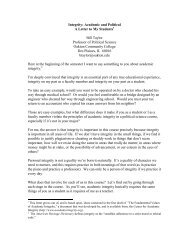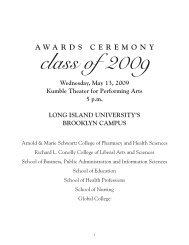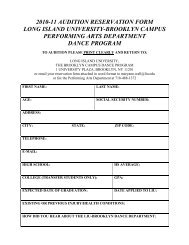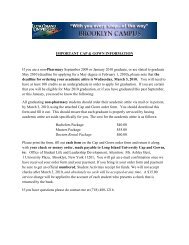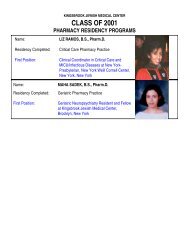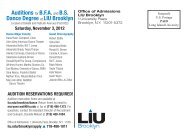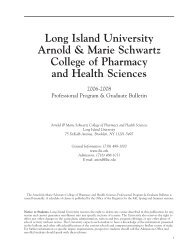united nations advanced certificate faculty - Long Island University
united nations advanced certificate faculty - Long Island University
united nations advanced certificate faculty - Long Island University
Create successful ePaper yourself
Turn your PDF publications into a flip-book with our unique Google optimized e-Paper software.
UNITED NATIONS ADVANCED CERTIFICATE FACULTY<br />
Henry Akintunde<br />
Adjunct Professor of Economics<br />
<strong>Long</strong> <strong>Island</strong> <strong>University</strong><br />
Jacques Fomerand<br />
Head<br />
United Nations <strong>University</strong> Office<br />
in North America, ret.<br />
Paul Hoeffel<br />
Chief, UN NGO Section<br />
UN Department of Public Information<br />
Walter Hoffman<br />
Executive Director<br />
Center for UN Reform Education<br />
Timothy Houlihan<br />
Associate Academic Dean<br />
St. Francis College<br />
Dragos Kostich<br />
Professor Emeritus<br />
<strong>Long</strong> <strong>Island</strong> <strong>University</strong><br />
Akira Kusukawa<br />
Director, European Council<br />
UN Funds for Population Activities, ret.<br />
Yasmine Sherif<br />
Protection Consultant<br />
International Rescue Committee<br />
Khartoum, Sudan<br />
James Sutterlin<br />
Director, Political Affairs Division<br />
UN Secretariat, ret.<br />
Lester Wilson<br />
Professor of History<br />
<strong>Long</strong> <strong>Island</strong> <strong>University</strong><br />
UNITED NATIONS ADVANCED CERTIFICATE STUDENTS<br />
Ebrahim Aamer, Bahrain; Betsuaye Abia, Nigeria; Faisal Al-Athba, Qatar; Ahmad Alhariri, Syria;<br />
Maria Barry, United Kingdom; Maurice Brooks, USA; Peg Byron, USA; Claudine Charlet, Haiti;<br />
Emilijan Djindjic, Yugoslavia; Camille Evans, USA; Zelia Evzona, Cyprus; Lourdeth Ferguson,<br />
Guyana; Mauricio Forero-Jimenez, Columbia; Mirna Germano, Brazil; Daniella Gilles, Canada;<br />
Helene Hoedl, Austria; Paul Irving, Jamaica; Fabiola Knight, Guatemala; Irma Lacey, Barbados;<br />
Jemma Lessie, Grenada; Keith Middlemark, USA. Maria Montagna, Argentina; Steve Naber, USA;<br />
Lisi Nelson, USA; Ulrika Nilsson, Sweden; Sophia Ojha, India; Edwin Perez, Dominican Republic;<br />
Vincenzo Pugliese, Dominican Republic; Augusto Rabellino, Argentina; Sri Raman, India; Alexander<br />
Romeo, USA; Grid Rroji, Albania; Hussein Sabbagh, Syria; Daniel Samuel, USA; Bryma Sylla,<br />
Liberia; Edyta Tabor, USA; Toni Thompson; USA; Mohammed Tounkara, Guinea; Fan Xiao,<br />
Peoples Republic of China<br />
United Nations Graduate Certificate Program<br />
<strong>Long</strong> <strong>Island</strong> <strong>University</strong> / Brooklyn Campus / Brooklyn, New York 11201<br />
Lester N. Wilson, Ph.D., Director<br />
(Lester.Wilson@liu.edu)<br />
(www.liu.edu/un)<br />
1
CHILD SOLDIERS IN SIERRA LEONE<br />
The Reverend Jose M. Caballero Caceres, MA’98<br />
Sierra Leone is a coastal West African<br />
country that shares borders with Guinea<br />
and Liberia. It has a population of close<br />
to five-and-a-half million (July 2001<br />
estimate) and includes 16 ethnic groups.<br />
The rebel war in Sierra Leone, which<br />
started in 1991 and ended in January<br />
2002, was characterized by a mass displacement<br />
of civilians, looting, the<br />
destruction of homes and infrastructures,<br />
the misuse of economic resources<br />
and terrible atrocities inflicted on the<br />
Father Caballero with Child Ex-Combatants civilian population–amputations, rapes,<br />
mutilations, killings and abductions.<br />
The link between diamonds and armed conflict in Sierra Leone is obvious and has been exposed,<br />
investigated and universally deplored.<br />
A key element to the prolongation of the war was the abduction/recruitment of children into the<br />
fighting forces. Children were perceived to be the best fighters, as they were obedient and easily<br />
manipulated. With over 50% of the population in Sierra Leone under the age of 18 and a war that<br />
has lasted for over 10 years, the number of children who have been used as fighters or camp followers<br />
is unknown.<br />
Children abducted over the years were used as human shields, camp followers and “wives” and,<br />
ultimately, they were trained to be soldiers. Following abduction, they were forced to carry heavy<br />
loads on their heads and were ordered to pick up the weapons of those who were killed should<br />
there be an attack on the group. They spent months trekking over hazardous terrain and many did<br />
not make it to the main camps. All the children were forced to learn to “cock” and “load,” and<br />
their commanders disposed of those who refused to learn. Punishment for not complying with<br />
their new life and trying to run away was death. Those lucky enough not to be killed were tied to<br />
a tree, with AFRC or RUF cut into their chests. Life for girls always started with rape, which was<br />
usually done in full view of others. Girls as young as 10 years of age were forced to have sex on<br />
a daily basis and with whomever. They returned home traumatized, diseased and suffering from<br />
internal injuries.<br />
Many children, some as young as seven years of age, were fighting on the government’s side.<br />
They were initiated into traditional hunting groups that came under the framework of the Civil<br />
Defense Force (CDF). Magical powers were bestowed on these children in initiation ceremonies,<br />
and they were led to believe that they had special powers, such as being “bullet proof.”<br />
2
During the course of the war, hundreds of thousands of children were displaced internally, for<br />
many, two or three times. Many others became refugees in neighboring countries. Finally, the<br />
increased family impoverishment and continued separation of children from their families contributed<br />
to the increase in the number of children on the streets and the arrests of children for common<br />
crimes. These children were detained in facilities that were far below minimum international<br />
standards and conditions.<br />
The Xaverian Missionaries Programme for the<br />
Rehabilitation and Reintegration of Child Ex-Combatants.<br />
To address the needs of separated children (child soldiers, unaccompanied children and children<br />
suffering from war-related stress UNICEF developed a Child Protection Program in Sierra Leone.<br />
This programme succeeded in establishing structures for the demobilization and reintegration of<br />
child soldiers and identification, registration, documentation and reunification of children separated<br />
from their families.<br />
In 1999, the Xaverian Missionaries joined UNICEF in this program. We offered a center where<br />
children who had been with the fighting forces could start their process of rehabilitation. Our center,<br />
St. Michael’s Interim Care Center, was located in Lakka, a small village near Freetown, the<br />
capital city. By July 1999, large numbers of children were being admitted to St. Michael’s in<br />
response to the Lome Peace Accord and, by January 2000, the center was well over capacity. The<br />
reunification of children with their families was almost impossible. The center was becoming<br />
unmanageable, and the general view was that the center had become a “parking-lot” where children<br />
were placed and from which there was no way out.<br />
In an attempt to solve this problem, we decided to move children out into the community and into<br />
a program we called Alternative Care. This was something new and few people believed it would<br />
work. However, we proved that it was possible. Eventually, UNICEF adopted the idea and our<br />
program became a pilot for other centers in Sierra Leone. Journalists, researchers and world leaders<br />
(among them UN Secretary General Kofi Annan) visited and studied the program. UNHCR<br />
also asked us to establish a similar program for separated refugee children returning into Sierra<br />
Leone.<br />
Children from the fighting forces (released abductees, child mothers, ex-combatants and other<br />
separated children) enter into the program through different channels. Since late 1999, most of the<br />
children came from the demobilization centers, although significant numbers were captured and<br />
handed over to UNICEF by the security forces, were part of a negotiated release/handover, or<br />
were picked up by UN military personnel on patrol. Irrespective of the way they entered the program,<br />
all the children had to spend a period of time in our center.<br />
St. Michael’s was based on the principle of family care in an environment that facilitated smooth<br />
reintegration. Children felt secure and comfortable in a protected environment. School, workshops,<br />
sports and other activities kept them busy during the whole day. The idea was that children<br />
could speak up and share their feelings. When they first arrived in the center they could be very<br />
violent and tended to show off. Stories of killings, amputations, rapes and lootings were common<br />
3
stuff during a child’s first weeks in the center. However, little by little he/she would tell the real<br />
story: the fears, the violence suffered, the tortures. That was the beginning of rehabilitation. Once<br />
the children told us their stories, we could provide an alternative to the violence and attempt to<br />
reunify them with their families. Children could either return to school or learn a job.<br />
Beginning the Rehabilitation Process<br />
It was important that children realized that they had done wrong even though they were not<br />
responsible for their actions. These feelings were clearly expressed in a prayer that many would<br />
repeat almost every day: “Papa God, I did not want to do it. I was forced to do it. Please forgive<br />
me.” Children whose parents could not be traced or whose families had rejected them were placed<br />
in long-term care programs. Little ones were sent to foster families. Older children were difficult<br />
to place and so group homes (a family taking care of four or five children) were set up to accommodate<br />
them, most of whom were young men. Apprenticeship and independent living were also<br />
responses to getting older children meaningfully occupied and back into the community.<br />
By January 2002, most of the children who were with the fighting forces had been released.<br />
(Tragically, a large group was forcibly taken to Liberia and later on to Ivory Coast where the<br />
armed conflicts continued.) At the end of April 2002 St. Michael’s was closed down. By that time,<br />
more than 3.000 children who had arrived in our center had been reunified with their families and<br />
were attending school or learning a job, and more than 200 children were living independently,<br />
working and taking care of themselves. However, there still remained a small number whose families<br />
could not be traced or refused to accept them. They are still living in group homes and foster<br />
families. A group of Sierra Leonean social workers that we have formed over the past years is<br />
now in charge of the program. After serving and living for nearly five years with the children of<br />
St. Michael’s programs, I feel now that I can move out and start new activities.<br />
❃ ❃ ❃<br />
4
INTERVIEW WITH PROFESSOR AKIRA KUSUKAWA<br />
Vincenzo Pugliese<br />
Professor Kusukawa has been a member of the UN Graduate Studies <strong>faculty</strong> since 1986.<br />
Profiled in the 2004 “Who’s Who in America” (58th edition), he spoke with Cosmos’s Vincenzo<br />
Pugliese at the end of <strong>Long</strong> <strong>Island</strong> <strong>University</strong>’s spring 2004 semester.<br />
Your bachelor’s in Pre-Medical Science and then your M.D. from Kyushu <strong>University</strong> led you<br />
to a Ph.D. in Medical Science, but with a major in demography. How did you become interested<br />
in demographic issues?<br />
Following my appointment as a senior lecturer in medical school at Kyushu <strong>University</strong>, I went to<br />
the John Hopkins <strong>University</strong> School of Hygiene under the sponsorship of the Rockefeller<br />
Foundation, where I met a number of physicians from developing countries. At that time, in the<br />
early 1950s, the demographic situation in many developing countries was becoming a serious<br />
problem. I wanted to dedicate myself to the medical areas of treatment and prevention, and demographic<br />
factors became key elements in my work.<br />
When you talk about treatment and prevention are you talking about a particular disease?<br />
Of course. Tuberculosis was widespread in Japan prior to World War II. It was the major cause<br />
of death. I was very much interested in preventing the spread of the disease, not just in its treatment.<br />
Therefore, prevention required work not only in medicine and public health, but also the<br />
economic, social and cultural situation of each affected area had to be considered. Hence, demographic<br />
factors came into play.<br />
5
The Second World War was underway while you were pursuing your bachelor’s in Japan.<br />
Did the political / social changes of those days influence somehow the branch of learning you<br />
chose to study?<br />
Not a bit. I had decided to enter the medical science area. Fortunately, military service was<br />
exempted for those joining this <strong>faculty</strong>. Therefore, I was not involved at all in anything connected<br />
with the war.<br />
You have had an extensive career at the UN, starting as a Social Affairs Officer in the<br />
Population Branch of the Bureau of Social Affairs in 1957. How did it all begin?<br />
Japan was admitted to the UN in 1956. The UN Secretariat, in 1957, was looking forward to<br />
recruiting Japanese nationals, and the population branch within the Bureau of Social Affairs was<br />
very much interested in recruiting young demographers. Around that time, the International Union<br />
for the Scientific Study of Population, which was the only international academic organization,<br />
recommended me. I was also supported by my university and by the Dean of the School of<br />
Hygiene of Johns Hopkins <strong>University</strong>. As a consequence, I was one of the first seven Japanese<br />
recruited by the UN secretariat.<br />
You mentioned that the Secretariat was very much interested in having Japanese nationals<br />
particularly in the area of population. Why was that?<br />
During and immediately after World War II, Japanese life expectancy was very low because of<br />
war casualties, including those caused by the atomic bomb. The life expectancy of Japanese males<br />
went down to 20 years of age, which was equivalent to that of the ancient Greeks! However, life<br />
expectancy went up quite quickly, as did the birth rate, thereby causing an explosive population<br />
growth. In an attempt to moderate the population growth rate, the government reacted by liberalizing<br />
abortions, which proved quite effective. For that matter, although family planning and abortion<br />
were almost a taboo in the UN at that time, many improvements were made through the study<br />
of demographic issues. I was particularly involved in life table constructions for Japan and with<br />
the various technological aspects of concern to the UN population branch. All this was very much<br />
in tune with my own research work.<br />
From 1959 to 1960 there seems to be a break in your UN career, as you were appointed as a<br />
Technical Adviser to the Council of Ministers of the government of Sudan. How did you like<br />
this experience? Were you taken on to deal with a specific issue?<br />
I was the technical adviser to the Council of Ministers of the Revolutionary Government of Sudan<br />
(1959-60). One of my major assignments was to make an analysis of the first Sudanese population<br />
census, which was taken by the government following independence. They wanted to incorporate<br />
future population and labor projections into national development planning. I was assigned<br />
to analyze this first census and make population projections based on my results. It was very challenging<br />
technical work, and somehow we succeeded in making accurate projections for the next<br />
15 years. The same procedure is still in use.<br />
6
As a Commission Secretary of the Population Commission (1964-1974), what were your<br />
duties? Were you involved in the preparation of the Annual Commission and/or the Annual<br />
Report?<br />
Of course. I had to prepare the Draft Agenda from A to Z and follow up with the election of officers,<br />
i.e., a chairman, vice chairman and rapporteur. At that time, the GA was gradually showing<br />
an interest in population matters, particularly at its 21 st session. The UN had always been a bit<br />
reluctant to adopt population action programs, as these would imply advising governments on the<br />
implications of rapid population growth in the areas of economic and social development. And<br />
these programs frequently raised controversial and sensitive issues. Eventually, the GA recognized<br />
their importance, so the Population Commission was charged to formulate policy and design programs<br />
in the areas of fertility, mortality, migration, and population structure. All this led to the<br />
1974 World Population Conference in Bucharest, the first UN intergovernmental population conference<br />
to adopt an action program.<br />
Have there been significant changes in the work of the Population Commission, either in<br />
procedural or substantive manners, from the years of your tenure until now?<br />
Yes. Around 1960, the growth rate of the world population peaked. In response, the UN worked<br />
to develop and implement impartial and scientifically correct population policies that would be<br />
suitable for member states. Also, member states sought advice from the UN on how to formulate<br />
population policies that would be suitable to their own countries, considering their particular<br />
social, economic and cultural realities. Therefore, the Population Commission was very much<br />
involved in preparing draft resolutions for ECOSOC and the GA on those issues. At the same<br />
time, there was a proposal by some member states (Denmark, the US, Japan) to create a fund for<br />
population programs, based on voluntary contributions, since the UN budget was already allocated<br />
to other areas. That’s how and why the UN Population Fund (UNFPA) was created.<br />
During your career at the UN, what were the most relevant issues on population and migration?<br />
Did you have to deal with any of them, and if so, in what way?<br />
At the beginning, the UN suffered a big handicap in forecasting world population projections<br />
owing to methodology limitations. We tended to underestimate future world population growth,<br />
but gradually we improved the techniques and methodologies of the projections, which become<br />
increasingly exact over time. In a sense, the demographic projections were far more accurate compared,<br />
let’s say, to economic forecasting, which was a reason for us to be proud. Sometimes we<br />
used what we called stable population models, because in some developing countries breakdowns<br />
of fertility and mortality rates were not available. Another important task was carried out in cooperation<br />
with the Statistical Office where we encouraged all member states to participate in a World<br />
Population Census. Starting in 1980, and in cooperation with the Statistical Office, we have managed<br />
to have almost global coverage of the population. That provided a basis for accurate demographic<br />
interpretations for use in economic and social development planning. UNFPA has successfully<br />
attracted considerable financial support for this very expensive enterprise.<br />
7
What were the main functions of the Policy and Programme Development Unit of United<br />
Nations Populations Fund (UNFPA) while you were working as Special Assistant to its<br />
Deputy Executive Director (1974-1977)?<br />
Around that time, practically all member states had become quite aware of the importance of population<br />
issues. Therefore, once a country had decided on a population policy, sometimes in association<br />
with UNFPA, it wanted to know what kind of programs needed to be implemented in order<br />
to fulfill that policy. In this respect I was heavily involved with almost all member states of the<br />
developing world in policy formulation and the implementation of respective programs.<br />
As Director of the Europe Branch of UNFPA (1977-1986), what were your major achievements<br />
and challenges?<br />
I worked mostly in Eastern Europe, where there had been some reluctance to formulate population<br />
policies because of the current political situation. Gradually governments began to undertake<br />
scientific population studies for use in economic and social development and finally they came to<br />
understand the overall importance of population issues. Some governments, Hungary was an<br />
example, were experiencing a population decline; they wanted to know how to alleviate the situation.<br />
So the UN became involved in advising individual Eastern European member states on<br />
population issues.<br />
Since 1953 you have been linked to academia, as a senior lecturer of the Faculty of Medicine<br />
at Kyushu <strong>University</strong> in Japan (1953-1957), then as a professor of demography in Bombay,<br />
and lastly as Adjunct Professor at New York Medical College and <strong>Long</strong> <strong>Island</strong> <strong>University</strong>.<br />
Why are you teaching?<br />
I am very interested in being involved with the new generation and sharing my views and experience.<br />
Sometimes I am confronted with very pointed questions, which I find exciting and challenging.<br />
I always give my best to students, and the experience is mutually beneficial, as I get a lot from<br />
them. I really don’t like what we call “one-way traffic.”<br />
❃ ❃ ❃<br />
The UNDPI/NGO/LIU Connection<br />
<strong>Long</strong> <strong>Island</strong> <strong>University</strong> has been an NGO in association with the United Nations Department of<br />
Public Information since 2000. Association is based on the university’s demonstrated interest in<br />
United Nations issues and proven ability to reach large or specialized audiences. This is done<br />
through information dissemination about UN activities, viz. academic programs devoted to UN<br />
studies, newsletters, bulletins, and pamphlets, conferences and seminars.<br />
8
ENDING INSECURITY MEANS ENDING THE OCCUPATION<br />
Professor Yasmine Sherif<br />
Professor Yasmine Sherif has served with the United<br />
Nations for 15 years in Africa, Asia and Europe and<br />
worked under Sergio Vieira de Mello’s leadership during<br />
his term as Under-Secretary-General for Humanitarian<br />
Affairs in New York. Professor Sherif recently has been<br />
appointed Protection Consultant for the International<br />
Rescue Committee in Khartoum, Sudan.<br />
“I have come here to learn, not to teach,” Sergio Vieira de Mello, the UN Special Representative<br />
for Iraq, reassured the Iraqi people when he arrived in their devastated country last June. “I am<br />
going to Iraq in solidarity with the Iraqi people,” Nadia Younes, his chief-of-staff told colleagues<br />
as she signed up for the UN mission in Baghdad. A similar commitment to serve was held by<br />
American Rick Hooper, who had previously worked with the UN in Gaza for seven years. All<br />
three were among those killed on August 19, 2003, in the bombing of the UN headquarters in<br />
Baghdad.<br />
Sergio Vieira de Mello and his staff did what the United Nations does better than anyone, namely<br />
serving a war-weary people in their quest for self-determination and democracy. The deaths of<br />
this dynamic UN veteran and 22 other people raise serious questions that go well beyond improving<br />
security for humanitarian workers. They compel us to examine the Bush administration’s questionable<br />
approach to liberty and self-determination. If these indeed are the true intentions of the<br />
US presence in Iraq, the coalition forces have fatally failed on at least three accounts:<br />
First, as long as US armored vehicles roll down the streets of Baghdad, and Washington insists on<br />
handpicking the Iraqi representation, there will no peace in Iraq. Reality on the ground demands<br />
we recognize that the occupation itself has greatly contributed to the magnitude of violence.<br />
Besides its illegality under international law, occupation, by definition, is an unnatural state that<br />
prevents progress toward self-determination and national independence.<br />
Second, the US administration has proven to be wanting in technical expertise with regard to<br />
peacebuilding toward self-determination. During the abhorrent and totalitarian regime of Saddam<br />
Hussein, Iraqis had no personal or political freedom, but they retained the basic necessities for<br />
their immediate survival, and UN humanitarian agencies operated with relative security. Today,<br />
despite the coalition intervention, Iraqis and the UN enjoy neither. The US appointed Governing<br />
Council is deprived of the political power required to have any significant say in the affairs of Iraq.<br />
Moreover, the infrastructure remains highly dysfunctional, while the security situation for skilled<br />
national and international UN workers has never been as insecure, preventing the implementation<br />
of a solid reconstruction program.<br />
Third, and perhaps worst, the Bush administration lacks the humility needed to win the hearts of<br />
9
a long-suffering people. In stark contrast to the words of Sergio Vieira de Mello and his staff, the<br />
Bush administration, through US civil administrator Paul Bremer and his staff on the ground,<br />
tends to tell the Iraqis what they should or should not do with an attitude of both teaching and<br />
preaching. A case in point is Paul Bremer’s bullet-point orders to the Iraqi Governing Council following<br />
the attack on the United Nations, whereby he urged the Council to give the public the<br />
impression that this puppet body was in charge of the country. “Tell them that the Governing<br />
Council needs to be seen governing, not later, but now,” the memo from his staff read. The patronizing<br />
tone of Bremer’s command to the powerless Council, whose hands are tied to US directives,<br />
did not go down well with some of its members. “We should have a real government, and then we<br />
could begin to solve Iraq’s problems,” one Council member responded in indignation.<br />
As for George W. Bush’s personal attitude to international problems, we are all too familiar with<br />
his crusade-like approach in the name of the “civilized world.” Tragically, the definition of “civilization”<br />
by the world’s most powerful political leader has proven to be a world order where international<br />
human rights law and the UN Charter, both of which represent humanity’s most profound<br />
and noble aspirations, are disregarded in favor of the US national interest.<br />
Most absurdly, the Bush administration has cornered the United Nations into legitimizing its<br />
breaches of international law. By adopting Security Council resolutions 1483 and 1500, the UN<br />
— scrambling for space to protect the Iraqi people — was placed in the bizarre position of collaborating<br />
with the very same power that had trashed its founding principles. As the Security Council<br />
meets again to find a solution to a problem that is inextricably linked to the Bush administration’s<br />
disrespect for the UN Charter, one can only hope that U.N. diplomats will be guided by Sergio<br />
Vieira de Mello’s last words, spoken as he lay dying in extreme pain: “Don’t let them pull out the<br />
mission.”<br />
In remembrance of our colleagues who died for the founding principles of the UN, the Security<br />
Council must now opt for a path that is consistent with the UN Charter and our universal standards.<br />
Moving to end the occupation based on a clear timetable, allowing free and fair elections,<br />
and restoring Iraqi sovereignty will be more effective at ending the current insecurity and instability<br />
in Iraq than adding more tanks to the streets of an occupied country.<br />
The UN must finally take charge of the reconstruction of Iraq simply because it knows something<br />
that the current US administration has proven it does not understand: liberty and human rights<br />
emerge out of trust and national ownership, not out of force and humiliation.<br />
Professor Sherif’s article was published by Reuters Foundation Alertnet (based in London) on 3<br />
September 2003. Reuters Alertnet reports on humanitarian global issues and primarily addresses<br />
the humanitarian, UN, and NGO communities (the Web Site has an estimated 100,000<br />
readers/month).<br />
❃ ❃ ❃<br />
10
ACUNS MEETS IN NEW YORK AND MOVES TO WATERLOO<br />
James Sutterlin<br />
The Academic Council on the United Nations System (ACUNS) held its annual meeting from 12-<br />
14 June 2003 in New York City. The theme of the meeting was A World Free of Fear, and plenary<br />
sessions dealt with various aspects of this broad subject. Ambassador William J. vanden Heuvel<br />
recalled that freedom from fear was one of the four freedoms defined by President Franklin D.<br />
Roosevelt as objectives for which the Allies fought in World War II and which underlay the founding<br />
of the United Nations.<br />
The well-attended meeting was highlighted by a public conversation with UN Secretary-General<br />
Kofi Annan conducted by Barbara Crossette, the former New York Times UN Bureau Chief at the<br />
New York. The Secretary General responded frankly to questions on US/UN relations, the war in<br />
Iraq, events in Liberia, and efforts being made by the UN to meet global economic development<br />
and health care challenges. Nico Schrijver, former ACUNS Board chair, delivered the annual John<br />
Holmes Memorial Lecture on The Use of Force Under the UN Charter: Restrictions and<br />
Loopholes. The keynote dinner speaker was the Honorable William (Bill) Graham, the Canadian<br />
minister of foreign affairs and international trade. The minister’s remarks clearly presaged the<br />
welcome that ACUNS will receive in its new headquarters in Canada.<br />
Having moved from Yale on 1 July, 2003, ACUNS is now happily ensconced on the campus of<br />
Wilfred Laurier <strong>University</strong> in Waterloo, Canada. ACUNS also enjoys the support of the<br />
<strong>University</strong> of Waterloo and the Center for International Governance Innovation, both of which are<br />
close neighbors of Wilfred Laurier. Waterloo is located just 45 minutes by car from Toronto’s<br />
International Airport. With the change in location, ACUNS acquired a new staff. Alistair Edgar, a<br />
professor at Wilfred Laurier <strong>University</strong>, is the new executive director. John Allison, who teaches<br />
both at Wilfred Laurier and the <strong>University</strong> of Waterloo, will be in charge of outreach, while<br />
Katherine Sage Hayes will be responsible for program development. While the cast and locale<br />
have changed, the policy objectives of ACUNS remain the same.<br />
ACUNS, Wilfred Laurier <strong>University</strong>, 75 <strong>University</strong> Avenue, West, Waterloo, Ontario, Canada<br />
N2L 3C5 (acuns@wlu.ca; www.acuns.wlu.ca)<br />
❃ ❃ ❃<br />
APPLICATION DEADLINES<br />
Comprehensive Examination 1 October 2004, 11 February 2005<br />
Graduation: 1 October 2004 (January Degree), 7 February 2005 (May Degree)<br />
11
INTERNSHIPS<br />
THE OFFICE FOR COORDINATION OF HUMANITARIAN AFFAIRS<br />
Agnieszka Godos<br />
While participating in the United Nations<br />
Program at <strong>Long</strong> <strong>Island</strong> <strong>University</strong>, it is really<br />
advisable to apply for an internship at the<br />
United Nations Headquarters or at other<br />
organizations affiliated with the UN. Just<br />
think about the possibility of meeting people<br />
from all over the world, working with a professional<br />
international staff, participating in<br />
conferences and briefings, attending Security<br />
Council open meetings, and having access to<br />
a rich source of information (very helpful in<br />
finding material for your courses)!<br />
After three days of introduction to the “UN family” you will begin working in your department,<br />
where your supervisors will explain your responsibilities and areas of work. Most often your tasks<br />
will include doing research, writing reports, taking notes during conferences, searching databases<br />
or working on a specific project.<br />
During my internship at the Office for Coordination of Humanitarian Affairs (OCHA),<br />
Department of Policy Development and Studies Section, I did a lot of research on internally displaced<br />
persons and their current situations in the countries where OCHA was conducting relief<br />
efforts. I also worked on the project of preparing National Policy for IDPs in Uganda. Besides, I<br />
had a chance to participate in a few inspiring meetings and conferences, e.g. Security Council<br />
meetings on counter-terrorism, a conference on introducing methods of telecommunication in<br />
Afghanistan, and a conference under the theme, Afghan Women Today: Realities and<br />
Opportunities. Afterwards, I wrote summaries or reports and submitted them to my supervisor.<br />
As I remember, every task was in a way interesting and absorbing. On the whole, the internship<br />
was really challenging. I can assure you that it was a great and unforgettable experience; especially<br />
when at the end you had the feeling of having made a contribution. A year has already passed,<br />
but I feel like I finished my internship yesterday. It will give you memories forever, not only of<br />
the place but also of the people you met and worked with.<br />
At the end of the internship all the interns gather for a picture and short meeting with UN<br />
Secretary-General Kofi Annan, with a traditional handshake. I was sad to see it all come to a close.<br />
The internship not only gives you practical training, but it also can provide a rich social life as<br />
well. To obtain an application form for an internship with the United Nations in New York City,<br />
you may download www.un.org/Depts/OHRM/intern.htm.<br />
12
THE UNITED NATIONS OFFICE FOR PROJECT SERVICES<br />
Sri Raman<br />
My first task at the United Nations Office for Project<br />
Services was to help in the preparation of its Annual Report,<br />
which included gathering statistics, designing the pages,<br />
contacting agents and clients and noting their comments,<br />
and finally formatting the document. In the midst of this, I<br />
had several other tasks to do, such as helping revise annual<br />
budget papers, downloading reports on the Internet, accompanying<br />
staff to meetings and taking minutes.<br />
This internship gave me an opportunity to interact with UN staff from different countries and of<br />
diverse cultural backgrounds. I also participated in some key decision-making meetings (Project<br />
Acceptance Review Committee) as an observer and this gave me an understanding of how large<br />
development programs are implemented.<br />
I would say that this experience has developed and reinforced a lot of positive personal traits, such<br />
as patience, maturity, confidence and prioritization of tasks. It also has given me an introduction<br />
to office work and, above all, to the operational modalities of a vast international organization<br />
such as the UN. It was a true introduction to diplomacy.<br />
THE CARNEGIE COUNCIL ON ETHICS AND INTERNATIONAL AFFAIRS<br />
Elizabeth Nelson<br />
I was an intern in the publications department of the<br />
Carnegie Council on Ethics and International Affairs for a<br />
period of eight months. The publications department consisted<br />
of the managing, associate and production editors,<br />
and myself. Most of my time was spent working on the journal<br />
Ethics & International Affairs, which at that time was<br />
published annually.<br />
I was able to work on various aspects of the journal. My responsibilities included coordinating the<br />
placement of advertisements in the journal as well as updating and creating new indices. By far<br />
the most interesting aspect was reviewing the articles that came in. The editors were eager for my<br />
feedback and open to my suggestions for revisions.<br />
I was able to use what I had learned from the UN Program during this internship, in the same way<br />
that I was able to use what I had learned at the Council in my classes. The two complimented each<br />
other very well. The Carnegie Council is a small, close-knit organization that was very welcoming.<br />
Having a strong interest in academics, I found it a very inspiring place to work.<br />
13
AT MEDICINS SANS FRONTIERES<br />
Thanda<br />
My internship at MSF-UN Liaison Office, from June 1998<br />
to May 1999, exposed me to both NGOs and the UN. The<br />
internship complemented what I had learned in LIU’s<br />
International Humanitarian Assistance class. As an intern, I<br />
assisted Catherine Dumait-Harper, MSF Representative to<br />
the United Nations, to liaise with the UN, with Member<br />
States and other NGOs.<br />
I helped Ms. Dumait-Harper prepare for briefings, conferences, roundtables and panel discussions.<br />
I attended UN-NGO meetings and informed MSF headquarters and field staff of UN<br />
humanitarian activities. I updated contact lists in database and e-mail. I drafted memos and daily<br />
correspondence, and coordinated meetings between MSF staff and UN officials. I organized and<br />
kept records on MSF country missions and thematic issues. I attended MSF briefings and debriefings<br />
of MSF doctors and nurses. In short, I helped facilitate MSF advocacy efforts involving the<br />
United Nations, Member States and especially the donors, and NGOs.<br />
AT THE UN DPI/NGO SECTION OF THE DEPARTMENT OF<br />
PUBLIC INFORMATION<br />
Lisa Matos<br />
The DPI/NGO Section has two different offices inside the<br />
UN where different work is done. The chief of the section,<br />
Paul Hoeffel, wanted the interns to have an opportunity to<br />
work in both the Resource Center and the 10 th floor office.<br />
From September to mid-October, I worked on the 10 th floor<br />
and helped organize the daylong DPI/NGO<br />
Communications Workshop, which was held at the end of<br />
November. The following six weeks I spent in the NGO/DPI<br />
Resource Center.<br />
I helped put the Communications Workshop program together and attended planning meetings<br />
with the workshop speakers. The following six weeks I spent in the NGO/DPI Resource Center<br />
where I also helped with the NGO accreditation process, sending out information, organizing the<br />
files, etc. In working with the DPI, I acquired a different perspective on how international civil<br />
society envisages the UN.<br />
The DPI/NGO Section staff was my family during the time I was in New York for the internship.<br />
New York can be a very intimidating city, but I always felt protected and taken care of by them.<br />
They made me want to come back to New York and to the UN. The following year, Fall 2001, I<br />
started the UN graduate studies program at <strong>Long</strong> <strong>Island</strong> <strong>University</strong>.<br />
14
THE PH.D.<br />
Hiroshi Kaihara<br />
I graduated from Meiji <strong>University</strong>, a private university in Japan, in 1988.<br />
Somehow I wanted to work for the United Nations. So I left Japan in 1993<br />
and spent a year learning English at the <strong>University</strong> of South Alabama in<br />
Mobile. The following year, I came to New York and began studies that<br />
led to a Master’s Degree in Social Science and a United Nations Graduate<br />
Certificate (1996). I chatted with Professor Wilson a lot. That helped<br />
improve my oral communication skills and remains a good memory. I<br />
stayed in the Brooklyn Campus dormitory and, although I could go anywhere<br />
I wanted, I rarely ventured off campus, even to go to the<br />
Metropolitan Museum of Art. Rather, I became completely absorbed in studying, almost like a<br />
monk. Two books in particular opened my eyes: Ernest Gellner’s Plow, Sword and Book and Karl<br />
Popper’s Open Society and Its Enemies.<br />
In the fall of 1997, I became an International Relations major in the Political Science Department<br />
at the Graduate Center of the City <strong>University</strong> of New York (CUNY). You have to do a lot to earn<br />
a Ph.D.! You need to complete 60 credits of course work, pass two comprehensive exams (one<br />
written, one oral), pass two foreign language tests, and write a dissertation. The written exam is<br />
on your major and minor fields. During the oral exam, you are grilled by five professors. Actually,<br />
I had fun because everybody listened to me! I passed the Japanese language exam, obviously, and<br />
was able to substitute a Chinese course taken at Hunter College for the test in a second foreign<br />
language.<br />
The dissertation was one of my most frustrating experiences. First, I could not come up with a<br />
good idea. Idly, one year passed by. So I changed my mind and decided to write on something I<br />
could do with my present ability. I chose the political power structure of Japanese politics. Then<br />
I had a very hard time communicating with my dissertation sponsor. You cannot get your dissertation<br />
accepted unless your sponsor gives you the green light. The longer I worked with my sponsor,<br />
the more I realized how our views differed. And this all happened even though I had chosen<br />
the sponsor! Nonetheless, I successfully defended my dissertation in December 2003. That was<br />
the final stage of the whole Ph.D. process. It took almost 7 years (from spring 1997 to fall 2003),<br />
although I took two years of leave of absence.<br />
Now, having acquired a Ph.D., the real test for me has started. Yes, I need a job!! The job market<br />
for political science is too tight. Simply too many universities are producing too many Ph.D.s for<br />
not very many tenured positions. Right now, I have a graduate teaching fellowship from the<br />
Graduate Center, which guarantees me a modest salary for three years, and I am teaching<br />
American politics, American foreign policy, world politics, and East Asian politics at Brooklyn<br />
College as an adjunct instructor. Probably because I look young (although I am already 35, not<br />
young at all by Japanese standards), naturally students challenge me freely. So I have to prepare<br />
for their ambushes. Overall I enjoy teaching. After all, I am only discussing something I am interested<br />
in. So if I can continue to teach with a better salary my life will not be so bad. My email<br />
address is hkaihara@gc.cuny.edu.<br />
❃ ❃ ❃<br />
15
CERTIFICATE IN UNITED NATIONS STUDIES, 2003-2004<br />
Betsuaye Wilson Abia<br />
Mehret Asefaw<br />
Joseph O. Babatunde<br />
Roaslind M. Chandler<br />
Aminata R. Coker<br />
Agnieszka Godos<br />
Aina Etuhole Iiyambo<br />
Elba Janeth Lara<br />
Lorna Allison Malcolm<br />
Lisa Matos<br />
Esther Dawn Nunez<br />
PUBLICATIONS / PAPERS<br />
Jacques Fomerand, The Role of the United Nations in the Fight Against Terrorism.<br />
Conference Paper: 7 th Biannual Conference on International Perspectives on Crime, Justice and<br />
Public Order. Bucharest, June 2004<br />
Jacques Fomerand, “Issues Before the General Assembly: UN Humanitarian Interventions”, in<br />
UN/USA Annual Issues Before the General Assembly, 2004<br />
Jean Krasno and James Sutterlin, The United Nations and Iraq: Defanging the Viper, 2003<br />
James Sutterlin, The UN and the Maintenance of International Security, 2 nd ed., 2003<br />
Michael Tarallo (MA, ’95) UN Budgeting: A Sound Leap Forward, 2004<br />
NEW COURSES<br />
UN 717: The United Nations and Global Terrorism<br />
This course explores these questions with particular attention to the novel features of the threat<br />
posed by terrorism to international peace and security. It examines the effectiveness of applying<br />
traditional models and mechanisms for dealing with the security challenges posed by terrorism<br />
and addressing its root causes, and what can be done through the United Nations to contain and<br />
suppress terrorism. Professor Fomerand<br />
UN 716: The United Nations and the Middle East<br />
The seminar will examine the events that led to the initial involvement and continued engagement<br />
of the United Nations in the Middle East. Starting with the Balfour Declaration through the independence<br />
of Israel followed by the various Security Council and General Assembly resolutions on<br />
the situation to the present “road map”, the student will explore the role of the United Nations in<br />
the Israel/Palestine question. The seminar will also discuss the impact of the Gulf War, the recent<br />
intervention in Iraq, and the current challenges facing the United Nations in the fields of democratization,<br />
disarmament, and human rights in the region. Professor Sherif<br />
16
NEWS FROM FAR AND NEAR<br />
Mahamadou Abou is in Sierra Leone, where he is the Executive Director of the OIC<br />
Trust Fund for Reconstruction, Rehabilitation and Humanitarian Assistance. Manuel<br />
Arcos, MS’01, has been promoted to Deputy Chief of the Security and Safety<br />
Section in the United Nations Office at Vienna. Jose Caballero, MA’98, is in northern<br />
Sierra Leone where he directs a new Xavarian Missionaries program based on<br />
education (schools, formation of teachers, etc.) to help bring development to this<br />
remote area of the country. Kelly Campion-Socol, MS’96, is database manager for<br />
the Jacob Burns Film Center, a not-for-profit cultural arts institution in Pleasantville,<br />
NY. Also, little Paige Nancy is a new arrival in the Socol household. (Please refer to<br />
the “Class of 2025”.) Benjamin Enoma, MPA’98, is in the Ph.D. program at the<br />
Graduate Center of the City <strong>University</strong> of New York. He received a Dean Harrison<br />
Fellowship Award and an Urban Education <strong>University</strong> Fellowship. Jorge Flores,<br />
MS’95, has returned to the Honduran Mission to the United Nations as deputy<br />
ambassador. Milena Gomez Mikac, MS’96, is working for Canada Customs and<br />
Revenue as an enforcement officer. Ricardo Mikac was added to the family on 11<br />
June. Takakazu Ito is in the Security Sector Team at UNDP/Kosovo as a program<br />
analyst. Leslie Jean-Pierre recently founded The Minority Peace Corps Association.<br />
Tomoko Kase, MS’96, joined General Electric in Tokyo as a mid-career executive.<br />
She recruits international staffing. Shova Khatry, MS’98, is still with UNEP in<br />
Nairobi. Yashna Khatry (MS’30) was born in June 2003. Neil Liberty, MA’97, has<br />
moved to Sao Paulo, Brazil, where he is in his second year of teaching history and<br />
English. Martha Mai-Gould, MS’02, has been appointed Deputy Project Manager<br />
of the UN Office for Project Services’ Iraq Project. Alvaro Melo, MS’99, is organizing<br />
a UN Program Alumni Advisory Committee. Md. Moslehuddin, MS’96 is an<br />
account administrator in the New York City Office of Labor Relations. Elizabeth<br />
Nelson, MS’01, is completing her first “grueling” year at Columbia <strong>University</strong> Law<br />
School. Susan Ngo-Mandong, MS’95, has returned to the United Nations<br />
Population Fund’s Africa Division after twenty months in the United Nations Office<br />
of Projects and Services. Vincenzo Pugliese works as an assistant in the<br />
Communications and Speechwriting Unit in the Executive Office of the Secretary-<br />
General; Selvyn Saldano, MS’99, after a two-year assignment in Beirut, is contemplating<br />
returning to New York, or perhaps to the Regional Commission for the<br />
Caribbean. He successfully passed the “G to P” examination in 2001. Mohmmed<br />
Saleh, MA’03, is in the Directorate of International Organizations at Bahrain’s<br />
Ministry of Foreign Affairs. He also lectures to newly appointed diplomats on UNrelated<br />
issues and plans to pursue a Ph.D. in Peace Studies at Bradford <strong>University</strong><br />
(UK). Lester Wilson, PhD’63, as a member of the Executive Committee of NGOs<br />
Associated with the UN Department of Public Information, is chairman of its<br />
Communications Workshops and Elections Committees. He also is co-editor of the<br />
Committee’s NGO Reporter.<br />
❃ ❃ ❃<br />
17
FALL 2004 SEMESTER COURSES<br />
History 632:<br />
Political Science 630:<br />
Political Science 642:<br />
UN 692:<br />
UN 706:<br />
UN 710:<br />
Contemporary World History<br />
Professor Wilson<br />
The American Constitution and Political System<br />
Professor Dimaio (Brooklyn, POL SCI required course)<br />
International Organizations, United Nations and its Affiliated<br />
Agencies<br />
Professor Sutterlin<br />
Modern Diplomacy<br />
Staff<br />
International Humanitarian Assistance<br />
Staff<br />
Research Methods<br />
Professor Wilson<br />
SPRING 2005 SEMESTER COURSES<br />
POL 505:<br />
POL 547:<br />
POL 605:<br />
SOC 606:<br />
SOC 553:<br />
UN 711:<br />
Foundations of Political Theory<br />
Professor Ehrenberg (Brooklyn, POL SCI required course)<br />
Human Rights in World Politics<br />
Staff<br />
Conflict Resolution<br />
Professor Sutterlin<br />
Sociology of Population and Demography<br />
Professor Kusukawa<br />
World Social Development<br />
Professor Wilson<br />
Research Seminar<br />
Professor Wilson<br />
18
Vincenzo Pugliese, Editor<br />
Photography: United Nations, UN/DPI Photo



